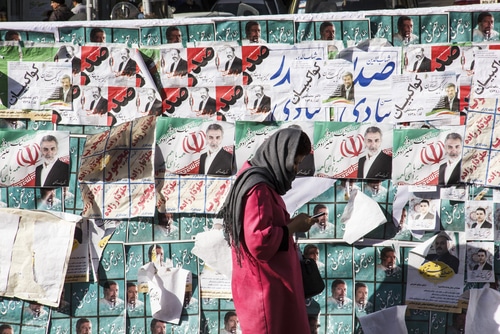Dear Josep Borrell, Boris Johnson, Emmanuel Macron, Angela Merkel:
On Friday, June 18th, the Islamic Republic of Iran held its thirteenth presidential election since the regime was founded in 1979. While normally an opportunity for the Iranian people to at least register their mood, this year’s ballot represents an almost meaningless charade.
The Islamic Republic is first and foremost a theocracy and its ruling clerics have always kept a tight grip on the country’s limited democratic processes. Even so, the field of candidates approved to run in this year’s election is more constrained than it has ever been in the 41-year history of the Islamic Republic.
On Monday, May 24th, the country’s Guardian Council barred all viable reformist or centrist candidates from participation in the election, leaving a field of seven hardline or hopeless candidates.
This winnowing of candidates was orchestrated with the clear purpose of ensuring the victory of Ebrahim Raisi, the candidate handpicked by Ayatollah Khamenei for the presidency. A hardline jurist, Raisi was placed on the US Treasury blacklist on November 10, 2019, for serial human rights violations. Raisi has never disputed, and indeed has built his political career on, the key role he played in the execution of thousands of political prisoners in the summer of 1988.
To this day, the United Nations continues to press the regime for answers regarding these events. Given this reputation, Raisi is unsurprisingly expected to preside over one of the most uncompromising administrations in the history of the Islamic Republic. His ascent to the presidency means that the Iranian people will be forced to endure the harshest possible interpretation of the theocratic regime’s value system.

Iranians went to the polls on June 18 to elect a new president, a figure that has limited constitutional powers as head of the government. More than half of the country’s population boycotted the vote after the Guardian Council – a 12-member body partly directly and indirectly chosen by Supreme Leader Ali Khamenei, which is responsible for vetting the presidential hopefuls – rejected several high-profile officials, including all reformists and moderates. FLICKR
Just as concerning is the fatalism with which the Iranian people have greeted this latest constriction of their democratic rights. Compared to the mass demonstrations of years gone by, such as in November 2019 when demonstrations sprang up in 21 cities, the Iranian public’s response to this latest affront has been one of crushed resignation. Reliable sources predict that the upcoming election will have the lowest participation rate in the regime’s history, with just one-third of eligible voters indicating that they plan to vote.
The significance of the June 18th election and Ebrahim Raisi’s predestined win should not be underestimated by Western leaders who are attempting to secure a resumption of the JCPOA (i.e. 2015 Iran nuclear deal). The 2015 accord failed to prevent the regime from suffocating Iranian public life, just as it failed to constrain Tehran from terrorising its neighbours and sowing disinformation around the globe.
European leaders must not forget the Iranian people as they sit down with the representatives of a regime that continues to tighten its grip over every facet of public life, from democratic rights to freedom of expression, religion and sexuality, to name but a few. Any new treaty which does not include some degree of protection for the Iranian people against a brutal sclerotic regime will amount not just to a failure of statecraft but a dereliction of moral duty.
Yours sincerely,
Radek Sikorski, Member of the European Parliament, former Minister of Foreign Affairs
Sir Ivor Roberts, former British Ambassador to Yugoslavia, Ireland and Italy and a former head of counter-terrorism in the Foreign & Commonwealth Office
Giulio Terzi di Sant’Agata, former Foreign Minister of Italy, former Italian Ambassador to the United States, former Permanent Representative of Italy to the United Nations, Senior Advisor to UANI
Dr August Hanning, former State Secretary in the Federal Interior Ministry of the Federal Republic of Germany and former Director Federal Intelligence Service, Senior Advisor to UANI
 UK PoliticsWorld PoliticsVideosPrivacy PolicyTerms And Conditions
UK PoliticsWorld PoliticsVideosPrivacy PolicyTerms And Conditions
